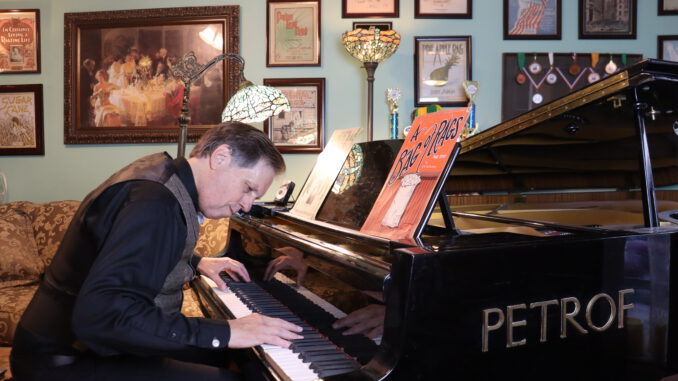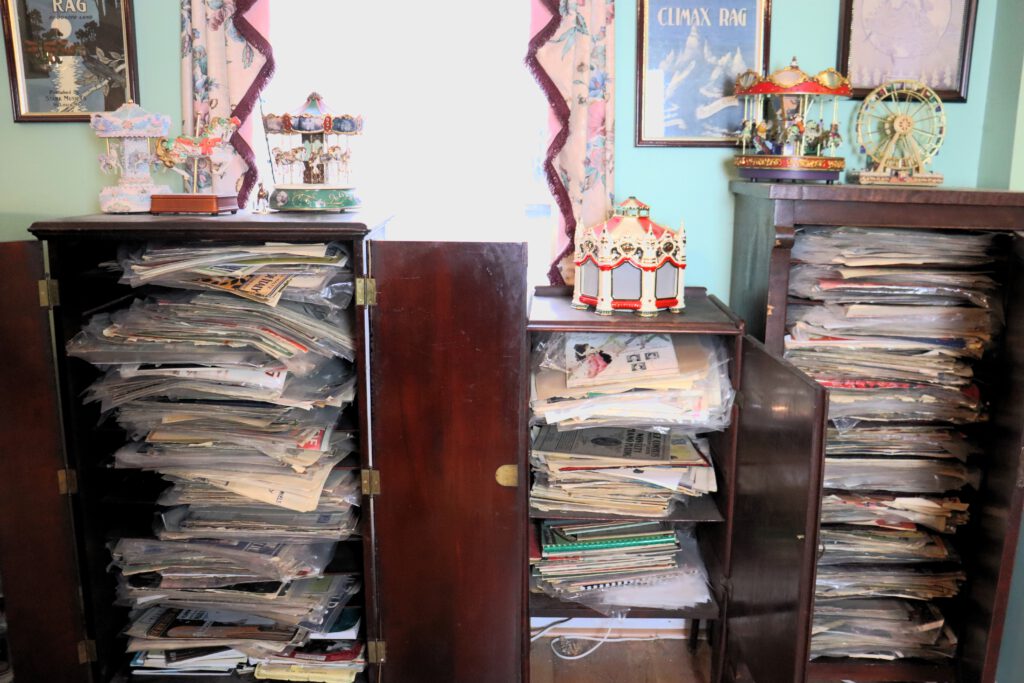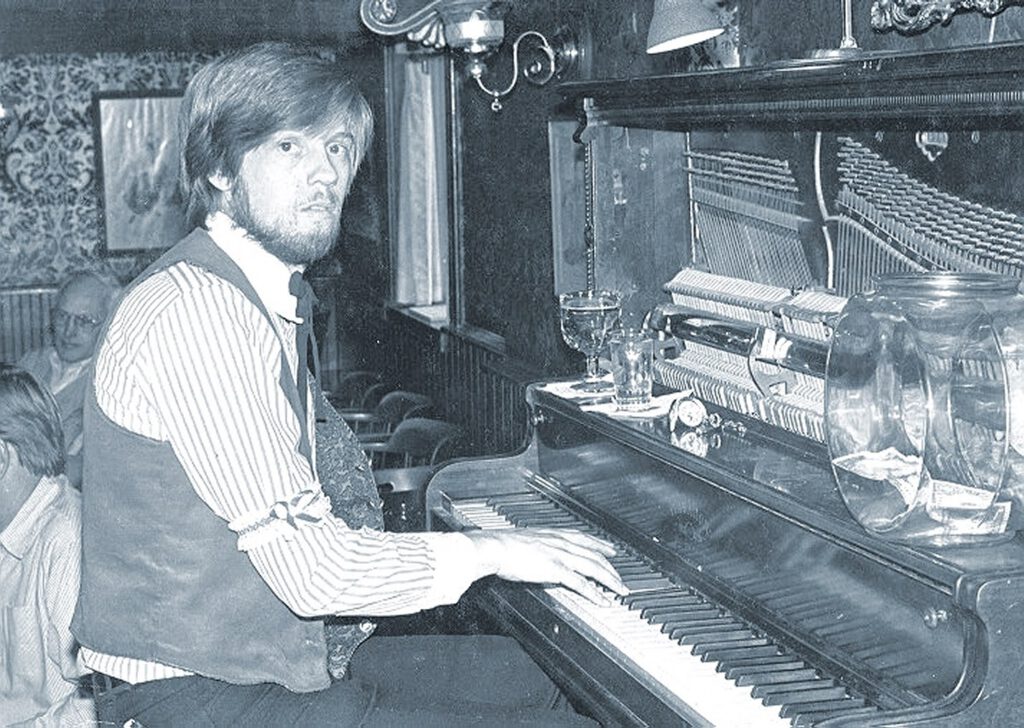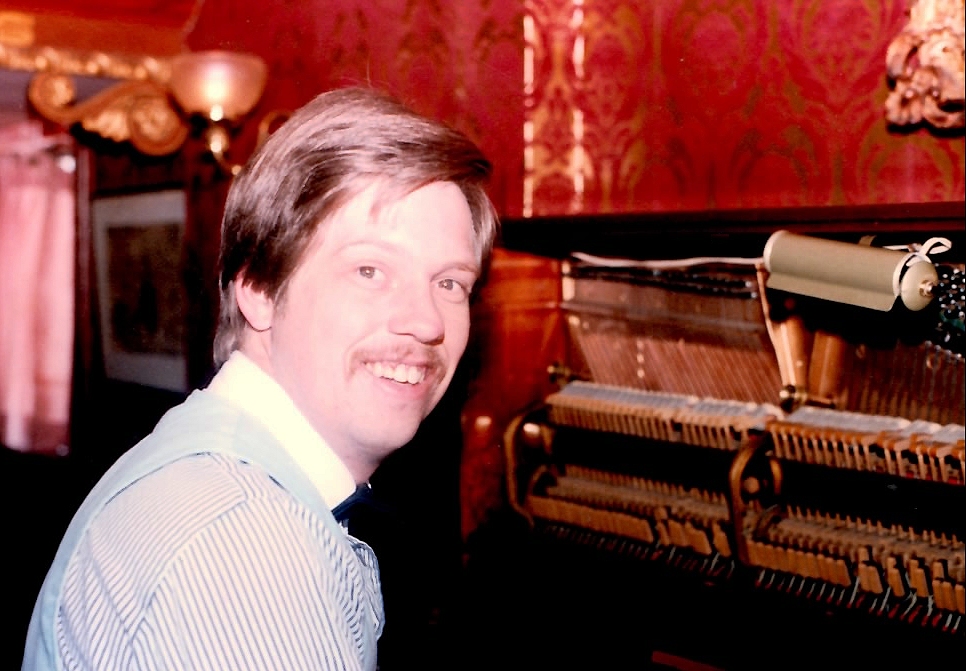
PIANO MAN
By Jill Devine
Ashburn musician Bill Edwards was a child living in California’s San Fernando Valley in 1964 when he discovered his life’s calling in an unlikely way – listening to a stack of worn 10-inch vinyl records his father left behind when his parents divorced.
“I discovered ragtime music when I was just 5 and have not been able to leave it alone since,” said Edwards.
The old records – including tunes from legendary musicians such as Frankie Carle, Joe “Fingers” Carr and Paul Lingle – brought joy and comfort to young Edwards as he adjusted to family changes.
“To escape the chaos around me, I would go to my room and bury myself in that music. When you listen to those tracks, it’s impossible to not be happy,” he said. “Sometimes I would put on a Disney record or something, but I always went back to those great ragtime albums. By the time I was 7, I decided I was going to be a piano player – that would be my thing.”
THE PRODIGY
It was an unusual choice of music for a boy growing up in the era of the Beatles. Ragtime, which today many associate only with silent films, old cartoons or maybe a Woody Allen movie, is a genuinely American genre of syncopated music that swept the country from the late 1890s into the early 1900s.
It originated in African-American communities in the southern and midwestern states and some of its most celebrated composers and performers were African-Americans, including Scott Joplin, known as the “King of Ragtime.”
“By 1900, everything in America was ragtime,” Edwards said. “It was like rock-and-roll 120 years ago – the stuff that parents hated, but young people loved.”
Playing on a piano his grandfather bought for him, Edwards began wowing friends and family with tunes such as the classic 1925 hit “Yes Sir, That’s My Baby.” By his early teens, in the 1970s, he discovered that playing songs like the BJ Thomas hit, “Raindrops Keep Fallin’ On My Head,” gave him a needed social boost at school.
“If you could play a movie song, people thought that was a big deal,” Edwards said.
By 14, Edwards had learned half of Joplin’s catalog, along with most of the songs by contemporary artists Elton John and Billy Joel.
Fast forward a few years, and Edwards’ childhood dream of becoming a professional piano player had come true. Today, he is an award-winning pianist who specializes in ragtime music. It’s a career he navigates in tandem with his full-time day job as a software developer for a local government contractor.
Edwards also happens to be one of the nation’s leading sources of encyclopedic information for all things ragtime.
THE “PERFESSOR”
Any online search on ragtime history, artists, composers or recordings eventually follows a digital trail to Edward’s townhome in the Courts and Ridges development in Ashburn.
That’s where Edwards manages a mind-boggling data-rich website – ragpiano.com – that constitutes a lifetime of research, collections, indexes, images and recordings related to ragtime music.
He’s done this partly under his stage name “Perfessor Bill.” That’s a nod to how concert hosts once introduced piano players – considered educated in music – to the audience as “professors,” often with grandiose gestures and affectations.
“Every bit of this website is 100 percent made by me, including all the software, lyric pages, descriptions, research, essays and graphics,” said Edwards of the ever-growing website he started 25 years ago. He describes the site as a labor of love, noting that it costs a lot more to maintain than he earns from online sales of his recordings or books.

“It’s my gift to the world, because I want to get this music out there,” he said. “My mission is to bring more people, especially youth, into the world of ragtime, so it is a passion that is worth the cost. I often tell people that I have a day job to pay for my ragtime habit.”
Edwards sells recordings of ragtime tunes, which he produces with professional equipment at home, through his independent label, Siggnal Sounds. He has also authored several books on ragtime topics.
THE ENTERTAINER
Before becoming a software developer, Edwards sustained himself for many years as a full-time musician, including a long stint as a pianist at the Fish Market in Old Town Alexandria. He has also played at the Kennedy Center and on a cruise ship.
One of his early gigs was at the Diamond Belle Saloon in Durango, Colo., and every summer he returns there to perform for a few weeks while continuing to work remotely during the day at his software job.
Edwards’ wife, Pamela, accompanies him on those yearly trips out west.
“I love to watch him perform, but when he’s playing at the Diamond Belle, I often can’t even get in because it’s packed, with not a table or seat left open,” she said. “Sometimes God just gives gifts, and Bill has a true gift. He’s intelligent, and his music makes people smile and laugh.”
Music is such a bond in the couple’s relationship that Bill Edwards actually played the piano during their wedding.
Every year in May, Edwards participates in the World Championship Old-Time Piano Playing Contest, now held in Oxford, Miss. In 1991, he took first place, and has been seeking to reclaim that title ever since.
“I’ve only missed one contest since I started competing. My obsession on regaining the title is a running gag at this point, but I’m usually in the top five and have a case full of medals, so I don’t do too badly,” Edwards said.
In 2008, Edwards was invited to be featured in an award-winning documentary, “The Entertainers,” which follows six musicians, suited in period-appropriate striped vests, derby hats and arm garters, as they strive to win the contest.
In the film, which was released in 2011 and is now available on Amazon Prime, Edwards summarizes his talents: “I’m not a great auto mechanic. I’m not good at sewing. I’m not good at judo. I claim to be only fair in football, and I’m a so-so singer. But I can play ragtime. I’ve got a black belt in it.”
THE PRESERVATIONIST
For many years, Edwards volunteered at Crossroads United Methodist Church in Ashburn as pianist.
“Bill brought a unique skill to our services,” said former Crossroads pastor Dave Norman. “He could play any genre, not just ragtime. Sometimes you hear music that just makes your jaw drop, and that’s how Bill plays the piano – it’s just amazing.”
Other places you might spot Edwards playing include Leesburg First Night events, private parties around the region and retirement communities, such as Waltonwood in Ashburn.
“The residents enjoyed his ragtime concerts, and they really liked his lecture on the silent movie era. They laughed as he played along to two silent films,” said Jocelyn Jackson, a life enrichment manager at Waltonwood.
Yes, as part of his mastery of music and history, Edwards is keeping alive the art of playing piano along with a silent movie – something that hasn’t been a mainstay of entertainment in nearly 100 years. Edwards is a subject expert on the topic and has a large library of silent films that he can bring to local bookings.
“People hire Bill to play accompaniment to silent films, and while they are watching he will tell the audience to boo and hiss when the villain comes, or to clap when the hero arrives, and it’s always really funny,” Pamela said. “He’ll ask audiences what people called silent films back in the day, and the answer is – films. No one knew that there would ever be sound films.”
Edwards knows that ragtime is often seen as an old-fashioned style of music – and playing it along with silent movies may just reinforce that. But he remains eternally hopeful that ragtime will find a resurgence among all ages – and once again be a new generation’s version of rock-and-roll.
“There is a weird kind of gene I think kicks in when people are about 50 or 55, and they go from listening to Metallica or Frank Zappa to suddenly liking Scott Joplin,” Edwards said. “But ragtime didn’t start out as old people’s music. It’s truly music for the young – and if a new generation just listens to it they’ll start to get it.”


